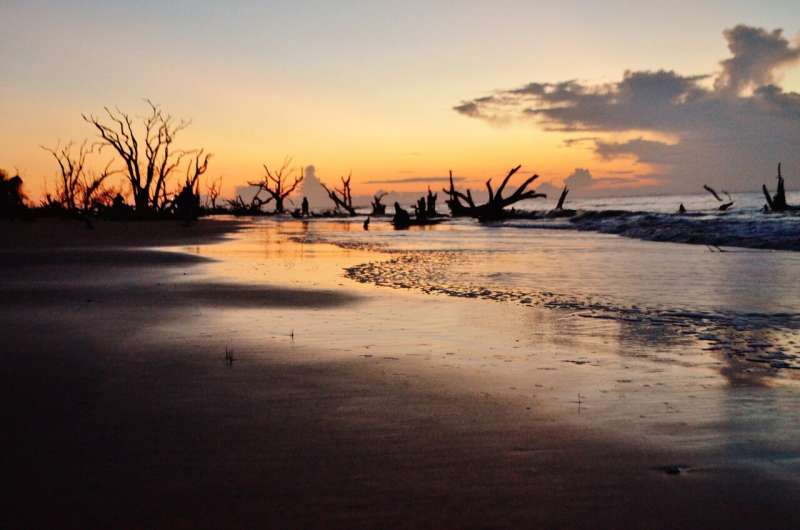This article has been reviewed according to Science X's editorial process and policies. Editors have highlighted the following attributes while ensuring the content's credibility:
fact-checked
reputable news agency
proofread
Flood risks rise as federal wetlands protections disappear: SC needs help, senators told

South Carolina's landscape is pockmarked with wetlands that have historically gotten in the way of developers seeking to build shopping malls, hotels and housing communities.
Now, because of a U.S. Supreme Court ruling last year, it is becoming easier for developers to fill and pave wetlands across the country. The ruling, according to some estimates, could eliminate federal protections for more than 60% of the nation's wetlands.
But wetlands are vital to limit pollution and control flooding—and that's why conservationists and some state officials are urging the Legislature to protect South Carolina's wetlands. Statewide legislation is needed to replace the federal rules the Supreme Court curtailed, they say.
South Carolina, which has one of the highest percentages of wetlands in the southeast, is increasingly dealing with floods that could get worse if more wetlands are lost, according to environmental groups and the state Office of Resilience. Wetlands naturally soak up storm water and filter out pollution.
Without a law to limit wetlands destruction, the lack of federal protection could doom many of the soggy depressions—and the state's already notable flooding problem will get worse, conservationists say.
"If you are filling in a bunch of wetlands, it puts communities at a bigger risk than they have ever faced from flooding," Carl Brzorad, an attorney with the Southern Environmental Law Center, said.
The law center, a nonprofit legal organization active throughout the South, laid out its concerns Wednesday during a briefing for the state Senate by conservationists.
"In South Carolina and across the nation, we have a significant number of wetlands that historically were protected and no longer have protection," the law center's Emily Wyche said in the presentation to senators. "So there's a big gap that needs to be filled."
Andrew Wunderley, the Charleston Waterkeeper, told senators wetlands are "nature's way" of protecting water quality.
Wetlands losses have been occurring across the country since settlers first arrived in the New World hundreds of years ago and began looking for places to farm or live. Some of South Carolina's most visible places, including the Charleston peninsula and Columbia's Five Points, were developed in low-lying, swampy areas.
With passage of the federal Clean Water Act in the early 1970s, the United States afforded some protection to wetlands, acknowledging that they are important to wildlife, in addition to soaking up flooding. Under federal law, anyone wanting to develop in wetlands needs a permit from the U.S. Army Corps of Engineers, a process that businesses have complained is cumbersome.
For the past 20 years, disputes involving developers and farmers against the federal government have sparked multiple court battles that have muddied the water over how many wetlands should be protected. Developers and farmers have complained that some wet areas of the landscape should not qualify as wetlands.
In the most recent case, the conservative U.S. Supreme Court said wetlands need an obvious connection to large bodies of water, such as rivers, lakes and the ocean, to enjoy protections. But many wetlands are connected less directly or are isolated, meaning many of them now could be developed, even though they are considered by scientists to be ecologically important. The greatest impact of the ruling is on freshwater wetlands, not salt marshes like those found near beaches.
Whether the Legislature will take action to protect South Carolina wetlands is a major question. Conservation groups did not offer a specific proposal Wednesday, and efforts in the past to establish a state wetlands law have failed in the face of opposition from farmers and developers.
The state has some protections for wetlands in the eight coastal counties through the coastal zone law, but even those are limited.
"It's politically going to be difficult, really, to get something in play," state Sen. Chip Campsen, R-Charleston, said. But he said South Carolina is "blessed" to have so many wetlands and he expressed concern about threats to them.
A special South Carolina task force in 2012 found there were approximately 400,000 acres of isolated wetlands in South Carolina. Overall, the state has more than 4 million acres of wetlands. With more than 20% of the landscape covered in wetlands, South Carolina has one of the highest percentages in the Southeast.
Those wetlands include rare Carolina Bays, elliptical, wildlife-rich depressions found almost exclusively in the Carolinas. Other types of isolated wetlands found in the state include cypress bogs, pine flatwoods and pocosins.
Calls by environmentalists to protect South Carolina's wetlands dovetail with the state Office of Resilience's plan to prepare South Carolina for the effects of natural disasters. The 2023 resilience office report urges the Legislature to save isolated wetlands that it says are vital to control flooding in South Carolina.
"New state legislation should be enacted to regulate the alteration of these unique systems to reduce the potential loss of function," the Resilience Office plan said.
2024 The State. Distributed by Tribune Content Agency, LLC.




















